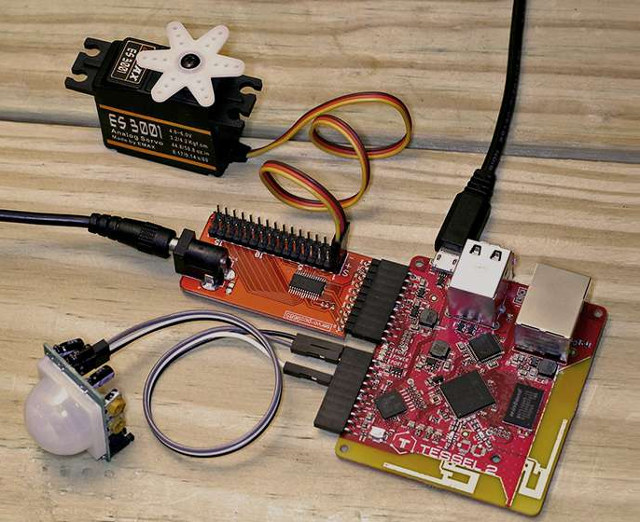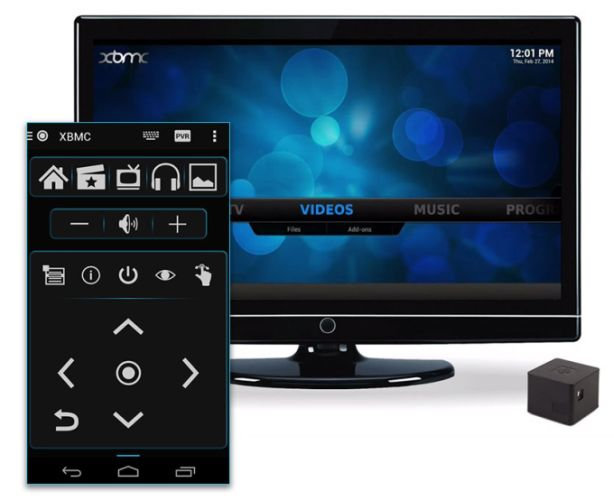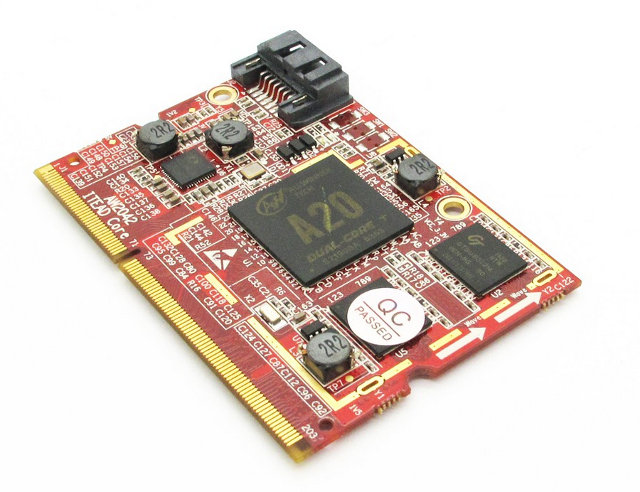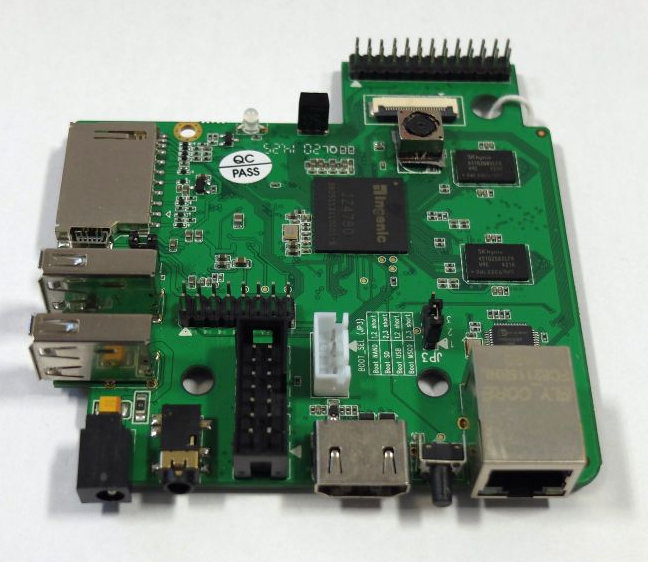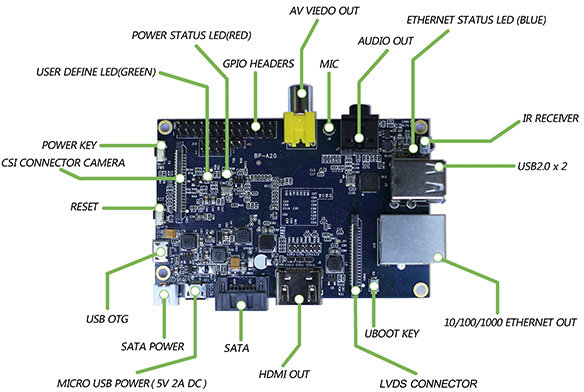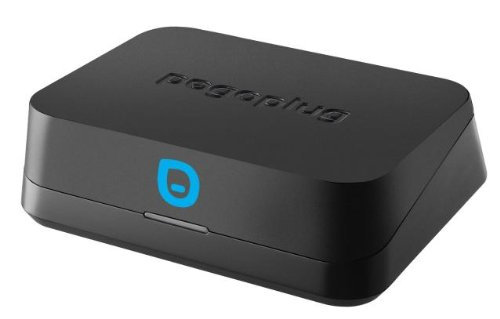Tessel is a Wi-Fi IoT board based on NXP LPC1830 Cortex M3 MCU and Texas Instruments CC3000 modules, that’s designed to bring embedded development to web programmers with a system that can be programmed with JavaScript and Node.js. At the time of the crowdfunding campaign in 2013, the board was available with external modules (Relays, sensors, Bluetooth LE…) for $100 and up, but now Technical Machine, the company behind the project, has announced Tessel 2 combining Atmel SAMD21 Cortex M0+ to control I/O and Mediatek MT7260n for Wi-Fi connectivity, still programmable with JavaScript ot Node.js. Tessel 2 specifications: MCU – Atmel SAMD21G14A-MU Cortex M0+ MCU @ 48MHz with 16KB SRAM and 2KB Flash SoC – Mediatek MT7260n MIPS24KEc Wi-Fi SoC @ 580 MHz System Memory – 64MB DDR2 Storage – 32MB flash for firmware (OpenWRT) Connectivity – 10/100M Ethernet, and Wi-Fi 802.11 b/g/n with dual PCB antennas USB – 2x […]
CuBoxTV is a $100 OpenELEC TV Box Powered by Freescale i.MX6 Quad SoC
Last year, Solidrun launched their Cubox-i mini PCs powered by Freescale i.MX6 single, dual or quad core processor, and running Debian, OpenSUSE, Android 4.4, or various XBMC based Linux distributions. The company has now announced a new product called CuboxTV, that on surface looks similar to their Cubox-i4Pro mini PC with a quad core processor, but instead of running Linux desktop distributions, or Android, it’s pre-loaded with OpenELEC Linux distribution running Kodi 14. CuboxTV specifications: SoC – Freescale i.MX6 Quad with four Cortex A9 core up to 1GHz, and Vivante GC2000 3D GPU System Memory – 1GB SDRAM @ 1066 MHz Storage – 8GB internal storage + micro SD interface Video Output – HDMI 1.4b, 3D support Video Decoders – MPEG-4 ASP, XVID, H.264 HP, H.263, MPEG-2 MP, MJPEG BP, VP8, Sorenson-H263. Video Encoders – MPEG-4 SP, H.264 BP, H.263, MJPEG BP Image Codecs – JPEG, BMP, GIF, PNG. Audio […]
ITEAD Core AW204X AllWinner A20 SoM and Core EVB Baseboard
ITEAD Studio has been making systems-on-module based on Allwinner processors for a little while which are found in the company’s IBOX mini PC, MOD Duo guitar pedal, and more. They’ve now launched a new system-on-module with a 204-pin SO-DIMM connector instead of the headers used in the earlier modules. ITEAD Core AW2041 / AW2042 SoM specifications: SoC- AllWinner A20 dual core ARM Cortex-A7 @ 1 GHz + ARM Mali 400 MP2 System Memory – 1 or 2 GB DDR3 RAM (AW2014: 1GB, AW2042: 2GB). Storage – 4GB NAND Flash, micro SD card slot (on the back), SATA connector. Connector – 204-pin SO-DIMM edge connector with UART, I2C, SPI, LCD, I2S, LVDS, GPIO, etc.. signals Misc – Built-in RTC, reset, FEL and power buttons. Power – 5V supply, 3.3V I/Os. AXP209 PMIC. Dimensions – 67.60 x 48.25 x 1.6 mm Weight – 35 grams Temperature Range – Commercial To facilitate development, the […]
MIPS Creator CI20 Development Board Powered by Ingenic JZ4780 SoC
There are plenty of ARM based development boards running Linux and Android, but with MIPS it’s a different story. Microchip does have some affordable development board powered by their MIPS MCUs, but these don’t have the hardware specs to run Linux based operating systems, and Ingenic Newton Platform for wearables can run Android and Linux, but it appears to be reversed to companies with virtual no documentation. There are some MIPS platform running OpenWRT on hardware such as routers or Wi-Fi boards, but these can’t be considered fully supported development boards. But Imagination Technologies is trying to make MIPS more relevant, first by launching Prpl developers’ community, and MIPS Creator CI20 development board powered by Ingenic JZ4780 dual core MIPS32 (Xburst) core processor with PowerVR SGX540 GPU should soon be available with complete documentation and source code. Let’s go through the hardware specifications first: SoC – Ingenic JZ4780 dual core […]
littleBits CloudBit Wi-Fi Module Simplifies DIY IoT Designs
littleBits Electronics is a company selling tiny modules that snap together with tiny magnets for prototyping called… littleBits. They do not require soldering, wiring, or programming, can be buttons, sensors, motors, etc…, and are the electronics equivalent of LEGO, and are suitable to 8 years old and older kids. The company have recently launched a new product called CloudBit, a module based on Freescale i.MX233 with Wi-Fi connectivity meant to be used/snapped with existing littleBits. CloudBit hardware specifications: Processor – Freescale i.MX233 ARM926EJ-S processor @ 454MHz System Memory – 64MB of RAM; Storage – microSD slot with included 4GB micro SD card pre-loaded with a customized Arch Linux ARM distribution Connectivity – 802.11b/g Wi-Fi via included USB dongle USB – micro USB port (for power only) Connectors – 2x BitSnap connectors for LittleBits connectivity using i.MX233 ADC/DAC signals Debugging – Pads for UART (3.3V, 8-N-1, 115,200 baud) to access the […]
Lemaker.org is Giving Away Banana Pi Development Boards to Developers and Fans
Banana Pi is a development board powered by AllWinner A20 dual core SoC with 1GB RAM, and with expansion headers and a form factor very similar to the Raspberry Pi. It can run Debian, Lubuntu, Android 4.2, Arch Linux ARM, Scratch OS, and OpenSuse, but Lemarker.org community would like more educational materials such as open source software or hardware projects, tutorials, etc.., so they’ve launched a program to give away boards to developers and people who can help writing and maintaining documentation. There are three categories of projects: STEAM – “Science, Technology, Engineering, Art & Mathematics” educational, open source projects running on the the Banana Pi Hardware or Software Project – Open source projects based on Banana Pi which could be helpful to the community, including open source hardware peripherals projects; Banana Pi Fans – You don’t need to be as technical as for the two others categories, but you […]
The World’s Cheapest Linux Computer? Pogoplug Mobile Now Sells for $7
Somebody asked “Anyone knows a computer cheaper than a Raspberry Pi with a network interface?” on Google+ mini PCs community. Some OpenWRT routers such as TPLink WR703N selling for about $20, or the VoCore Wi-Fi module selling for about the same price (Wi-Fi only) were parts of the answers, and I also mentioned some HDMI TV dongles that now sell for around $35, which is still a little cheaper than the Raspberry Pi model B when one considers shipping. But I found the answer by dhead666 particularly interesting: Pogoplug Mobile goes for 7$ on Amazon and that includes psu and network cable. It run Linux great (I’m using Arch) but you will want to have a ttl-usb cable and soldering iron available in case you manage to mess u-boot (go to the doozan’s forums for more info about the u-boot). Let’s have a look. Pogoplug Mobile is not a new […]
Marvell SMILE Plug DevKit is Now Available for $199
The SMILE Plug is a development kit, designed jointly by Marvell and Standford University, that brings Wi-Fi connectivity to a classroom, and allows up to 60 pupils / students to interact with their teacher via their phones’ or tablets’ web browser. Other possible applications include cloud computing, wireless AP, industrial control, medical instrumentation, office automation, as well as mesh and grid computing. The SMILE Plug is now available with the following updated specifications: SoC – Marvell ARMv7 compliant Marvell ARMADA 370 CPU System Memory – 512 MB DDR3 Storage – 1 GB NAND Flash + microSD slot Connectivity WiFi 802.11 a/b/g/n via Marvell Avastar 88W8764 4×4 WiFi for up to 60 nodes 2x Gigabit Ethernet USB – 2x USB 3.0 External backup battery for hours of reserve power* (optional accessory) Power on button and restart Power Supply – 12V/2amp external power supply JTAG and UART port for programming and debugging […]


